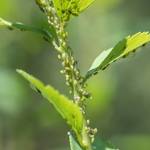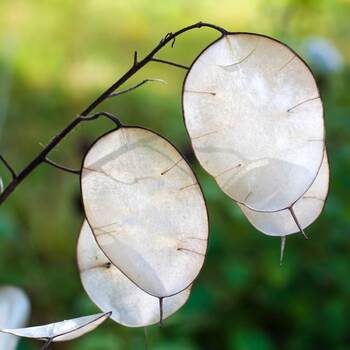
How to Grow Honesty Seeds
Grow Guide #2356
Family: Brassicaceae
Binomial name: Lunaria annua
Life Cycle: Biennial (often grown as an annual)
This 'How to Grow' guide details everything a home gardener needs to know to plant, grow and care for Honesty (Lunaria annua).
When to Sow Honesty Seeds
Honesty can be grown year-round in most climates. Avoid planting in extremely hot or cold weather which can affect germination and growth. Use the table below to identify the best time of year to sow honesty in your climate.
| JAN | FEB | MAR | APR | MAY | JUN | JUL | AUG | SEP | OCT | NOV | DEC | |
|---|---|---|---|---|---|---|---|---|---|---|---|---|
| Cool | ||||||||||||
| Temperate | ||||||||||||
| Sub-Tropical | ||||||||||||
| Tropical | ||||||||||||
| Arid |
Preparation
Honesty plants commonly self-seed in the garden. Self-seeding plants drop seeds onto the soil at the end of the season that may germinate and grow without help the following season. Choose a position where new plants will be welcome. If you do not want honesty to become established in your garden, deadhead plants before they can drop seed or grow them in containers.
Honesty plants are best grown in full sun or part shade. Choose a location that will receive at least 3 hours of full sun each day.
Honesty plants need a well drained soil enriched with plenty of organic matter. Prepare soil by weeding it thoroughly, digging it over to loosen it and adding aged animal manure or compost. Keep the area free of weeds until planting. Learn more about preparing soil for planting here.
How to Sow Honesty Seeds
Honesty seeds do not require any treatment (eg soaking, stratification) before sowing.
Honesty seeds grow best when they are raised in trays or other containers and transplanted to the garden once established.
- Fill trays, punnets or jiffy pots with a good quality seed-raising mix, or use soil starter pellets.
- Sow seeds 3mm deep.
- Keep soil moist but never wet or dry.
- Seeds should germinate in around 7-14 days at a soil temperature of 20-22°C.
- Transplant seedlings to the garden once they have their first true leaves and are large enough to handle (usually 5-10cm tall).
- Plant out, spacing plants 50cm apart.
How to Grow Honesty
Honesty plants may need watering during the growing season. Water when the soil is dry about 5cm below the surface (test this by scratching away a little soil with your finger). Water deeply in the early morning or late afternoon. Avoid watering the leaves of plants to avoid fungal diseases. Learn more about watering here.
If soil was well prepared no extra fertiliser should be necessary. In poor soil or to give your plants an extra boost, application of a high-potassium fertiliser or one formulated for flowering plants can be beneficial:
- Apply slow release fertiliser at the recommended rate when transplanting or when seedlings are 5-10cm tall.
- Apply liquid fertiliser at the recommended rate and frequency while plants are fruiting or flowering.
Honesty plants should flower in approximately 85-95 days.
The seed pods (botanically 'silicles') are flat, round and green when young, drying to brown and then a light silvery tan. To harvest seeds, cut individual seed pods when they have changed from green to brown but before they open and shed their seeds. Remove the seeds from the pods, spread them on paper towel and allow them to fully dry in a warm, dry place.
To use the seed pods as cut flowers, wait until they are fully dried, a light silvery colour and papery to touch. Using clean sharp secateurs or snips, cut whole stems at ground level. Stems can be used immediately or hung upside down in bunches for storage.
Common Problems when Growing Honesty
Like all plants, honesty is susceptible to some pests, diseases and other problems. Below is a list of the most common problems gardeners encounter when growing honesty plants:
 Aphids are small (2-4mm long) sap-sucking insects that congregate on the new shoots or the undersides of leaves. They can cause leaves to wilt or become discoloured, and also excrete honeydew which can attract ants and other insect pests. To manage aphids, remove them by spraying with a garden hose, apply a soap or alcohol spray, or encourage predatory insects to your garden. Read more about aphids here.
Aphids are small (2-4mm long) sap-sucking insects that congregate on the new shoots or the undersides of leaves. They can cause leaves to wilt or become discoloured, and also excrete honeydew which can attract ants and other insect pests. To manage aphids, remove them by spraying with a garden hose, apply a soap or alcohol spray, or encourage predatory insects to your garden. Read more about aphids here. Slugs and snails are molluscs that feed on tender leaves and shoots, mostly at night, leaving slimy trails behind them. Control them by removing their hiding places, keeping free range poultry, collecting them by torchlight or by placing traps. Read more about slugs and snails here.
Slugs and snails are molluscs that feed on tender leaves and shoots, mostly at night, leaving slimy trails behind them. Control them by removing their hiding places, keeping free range poultry, collecting them by torchlight or by placing traps. Read more about slugs and snails here.


.png)



